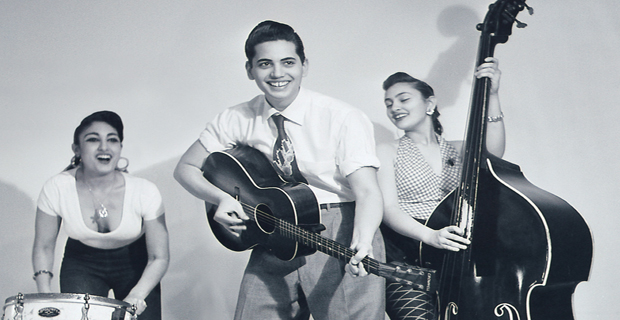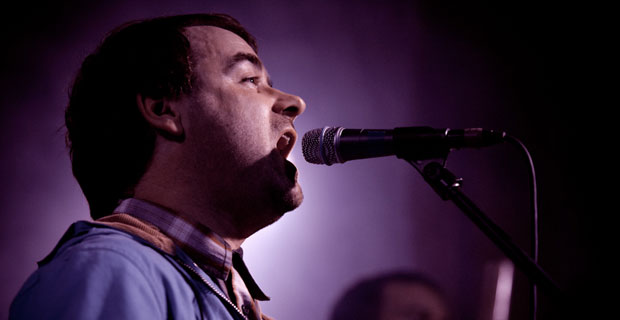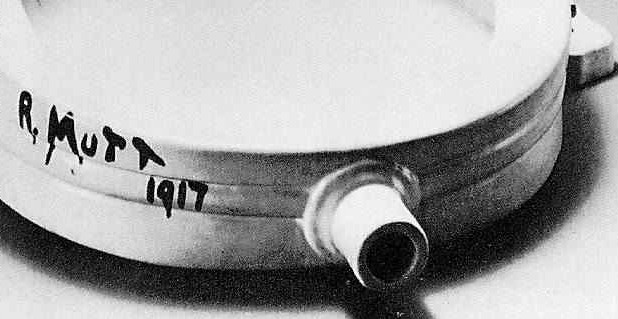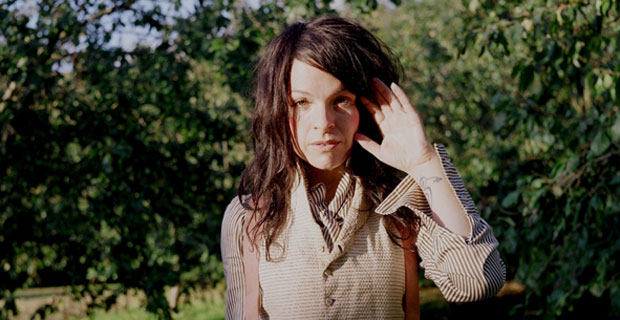Kitty, Daisy & Lewis are back on tour with new material from their second album, Smoking In Heaven, performed live to thousands of fans. The record is a real coming of age for the trio, being fully written by themselves in contrast to their self-titled debut, in which eight songs were covers learned through childhood and played with the rest of the family. Now three incredibly-competent, and highly confident adults command the stage, their parents barely noticable as backing musicians.
As we speak to them ahead of Friday’s gig at The Ruby Lounge in Manchester it’s clear that these siblings are not just confident onstage, with outspoken opinionated answers on everything from the impact of the digital age on music (“even if you’re not a band, if you’re just a normal bloke and you don’t have a facebook everyone’s like what!”) to the role of music journalism today; “now you read an article and it’s like, ‘this guy took loads of pills and threw something out of a window’.” If you were at the gig let us know your thoughts. Enjoy!
The new album is great. It feels different to the last one. The opening track, Tomorrow, for example has a real Ska feel.
Lewis: Yeah it is a Ska track and we got Eddie Thornton playing the trumpet. He was from Alpha Boys School in Jamaica.
Kitty: He lived with Hendrix at one point
L: He’s played with The Beatles and The Rolling Stones. He’s been playing with us for three years now and he always comes to our gigs. It’s a real honour to have him.
Daisy: We met him at a party, Tan Tan (Eddie Thornton) was there playing and he knew my dad about 30 years ago because he used to work at Island, and he cut some records for him. They recognised each other and were like ‘oh we wanna get you round and have a jam,’ so they took it from there.
Kitty: Everyone does it online now (meets each other) so it’s not quite the same
What do you think about the internet and the way it’s changing music? Is it working with it or against it?
L: I think it’s good in some ways, bands can be heard, but I think all this twitter and facebook… (he trials off, glancing down at the floor dismissively)
Every week there’s a new thing and it’s too much. Nowadays a band has to do all that stuff otherwise people say they can’t promote your record.
If a band say they didn’t have a facebook (he pauses contemplatively). Even if you’re not a band, if you’re just a normal bloke and you don’t have a facebook everyone’s like what! Are you serious? (The trio burst into laughter). How do you talk to people? How have you got any friends without facebook?
There’s the good side – that bands can be heard – and then there’s the bad side which is all that other crap…
Was it with reluctance that you set yourselves up a twitter?
D: We didn’t, the label did.
L: Have we got one? (Looks at sisters with a baffled stare)
K: (Looks to Lewis) We didn’t tell you because we knew you’d get cross.
D: At first we were like ‘fuck off,’ but then we just let them do it
httpv://www.youtube.com/watch?v=SyKmukkJTVQ
Would you say new album, Smoking In Heaven, is a record which displays a coming of age?
L: It’s odd in a way. Sometimes I think are these songs any good or are they shit?
(Others laugh)
D: Yeah, you can’t really tell when you’ve played them so much.
Did you have more confidence in the material on the last album because they were established songs already?
K: We’d been playing those songs since we were little kids. Before we went on stage we used to jam at home and our dad would sing to us. They were the songs we knew and were comfortable with when we started playing gigs out of the blue.
When it came to recording the second album, obviously we hadn’t written a lot before, and we missed our deadline a couple of times as well (chuckles). So we had to get together in a bit of a hurry and write all these songs.
I think we were still learning them as we were recording as well. Playing them on stage helps to develop them, but we didn’t really have that opportunity because it was all done in a bit of a hurry.
L: A lot of the songs weren’t played live before they were recorded and now some of them have changed. If we recorded it now it’d sound completely different I reckon (he admits, almost as though he regrets a hasty recording process).
K: Playing live is the best way to rehearse.
Was it recorded in the same home-built studio? It sounds a lot cleaner this time around.
L: Yeah I changed lots of the acoustics, rebuilt the mixing desk, and changed a lot of equipment for more American alternatives from quite an older period. I changed components in the amplifiers. It was trial and error. I think it does sound a lot cleaner and less like it’s in a small room, even though it’s in a small room.
D: We were still building the studio when we recorded the first album
It sounds like an amazing project to undertake, building a studio.
K: We had to though because we tried recording in other studios and it wasn’t happening so we decided to do it ourselves.
httpv://www.youtube.com/watch?v=GxW3Ed7GrhQ
What is it like touring as a family? The experience must bring you very closely together
K: We’ll never split up because we’re a family and we’re really close. There’s still a lot of arguments and bickering going on but five minutes later everything will be back to normal.
What do you squabble over?
K: Who farted on stage, the usual stuff. (All laughing once more.)
L: Apart from all that there is a musical connection. We know how each other plays. Sometimes we will come off stage and say Kitty wasn’t playing quite right, or Daisy wasn’t. You can tell when people are off their best. Because you’re a family you can say to people, ‘look, you’re playing shit. What are you doing,’ (laughs) rather than ‘oh, maybe you could try and do this…’
Why is it that rock’n’roll doesn’t seem to exist in a modern context?
K: I think people who play proper rock’n’roll are trying too hard to recreate how it was, whereas we’re just doing it in a way that we like
L: I don’t think rock’n’roll is really a genre, it’s been applied to Jazz bands of the ‘40s, right up to Oasis, but those two things are completely separate. Rockabilly is a genre but we’re not really a rockabilly band. A lot of people say we play ‘50s music but that doesn’t make sense at all, there was so much different stuff going on in that decade. We grew up on music from the ‘20s right up to the ‘80s and took in lots of different kinds of things.
D: This is another reason why we had to start writing songs, because we kept getting put into that category. We had to get away from the perception that the covers created.
Why do you think bands who play this style of music are seen as throwbacks rather than being able to exist today in their own right?
L: Journalists will see what you’re wearing and then describe what music they think you play from that. If we suddenly went onstage with pink Mohicans and nose rings then they wouldn’t call us rockabilly.
D: Obviously you can’t veer away from the fact that it’s not modern pop music and it has got a certain old sound but I do think it’s a media thing.
K: Also I think people don’t quite know how to describe us because we play so many different things.
D: There’s no way of describing it in one genre. There’s R’n’B, ska, blues and jazz.
L: It seems the whole point of music journalism is to try and categorize you, rather than actually talk about what’s actually happening in the music.
(Father comes into the room)
L: ‘Daad! Get out man.
L: If you read articles from NME in the early ‘60s when they talk about Muddy Waters coming over or Jazz, they really go into the history of the music and what happened on stage, whereas now you read an article and it’s like, ‘this guy took loads of pills and threw something out of a window.’
(Mother walks in and says, “I know you’re gonna bollock me but I need my bag.”)
L: (continues) So then when people do write about us it’s like…
They’re this age – they’ll say that first – and then they’ll say they’re a family, they went to school, and they play rockabilly. That’s more or less everything they write about us really.
Tell us more then. What about the music you listen to and play when not performing?
L: I think if you came to our house you’d probably hear blues records, or jazz, or calypso. You’d never walk in and hear Buddy Holly, but that’s what’s somehow in the articles that come out. If we were to say we listen to a name that no-one knew of then they wouldn’t write that.
It’s good to name people that go unrecognised though because then who’s to say the reader might not find something overlooked to take pleasure in? So give us some names and we’ll make sure we put them in.
L: Lord Kitchener, Duke of Iron (calypso guys) Mighty Sparrow, Lord Melody, Wilmoth Houdini, all those guys.
Were you never tempted to rebel against your parents and listen to something different?
K: Our parents never tried to impose it on us; it was just there in the house. There were always instruments around and records playing. My dad would just sit us on his knee and start playing so it was more of a fun thing. For entertainment at home we’d all get together and start jamming. It wasn’t like ‘do your piano lesson,’ although we did have that too. The teacher gave up on us, we couldn’t hack it.
D: Also the names Lewis just said, my parents wouldn’t have known who they were. We discovered a lot of music on our own and showed it to them, so it really worked both ways.
It must’ve been easy to become multi-instrumentalists with so many instruments around the house.
D: My first instrument was the drums. I used to bash around with that, and it’s all about the rhythm, same with the guitar, harmonica…
K: We all had a feel for rhythm and for music. As long as you have a feel for it then you can fiddle around with everything.
What words of advice would you have for someone who has a guitar in the corner of their room gathering dust like me?
K: Give it to someone who’ll use it! (all laughing once more.)




